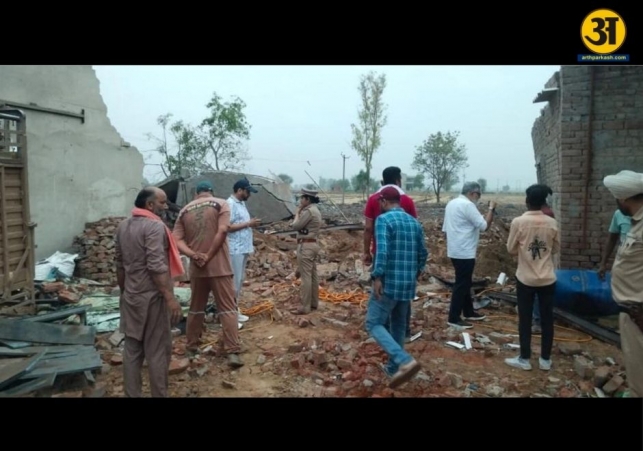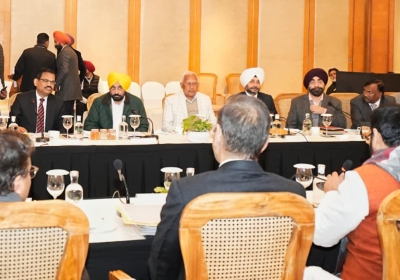
NGT issues notice in Muktsar cracker blast case
Muktsar cracker factory blast: NGT seeks replies from Central, Punjab pollution boards and DC
The National Green Tribunal (NGT) has taken serious notice of a blast in an illegal firecracker factory in Singhewala village, Muktsar district, Punjab. The explosion happened on May 30, 2025, and claimed the lives of five people while injuring 29 others. Acting on a news report published by Hindustan Times on May 31, the NGT took up the matter on its own (suo motu) and issued a detailed order on June 5.
A bench of Justice Arun Kumar Tyagi and expert member A Senthil Vel directed the Central Pollution Control Board (CPCB), the Punjab Pollution Control Board (PPCB), the regional office of the Union Ministry of Environment in Chandigarh, and the Muktsar deputy commissioner (DC) to respond to the incident.
The tribunal was shocked by the reported details. According to the HT report, the factory operator managed to buy a large amount of explosives and materials used to make firecrackers—without any legal permission. Even 10 hours after the explosion, the smell of potash (a chemical commonly used in firecrackers) was still coming from the debris at the blast site.
Factory violated many safety and environmental laws
In its order, the tribunal said this incident involved several serious violations. These include laws such as the Public Liability Insurance Act, the Environment (Protection) Act, the Manufacture, Storage and Import of Hazardous Chemicals Rules, the Chemical Accidents (Emergency Planning, Preparedness and Response) Rules, the Explosives Act, the Explosive Substances Act, and the Explosives Rules.
These laws exist to ensure that hazardous materials are stored, handled, and used safely, and that people and the environment are protected in case something goes wrong. In this case, the NGT observed that a lot went wrong because proper permissions and precautions were not taken.
The factory where the explosion happened was operating without legal approval, which itself is a serious issue. The fact that such a large amount of explosive material could be bought and used without detection shows clear failures in monitoring and law enforcement.
The NGT said the explosion raised important questions about how such materials are sold, who is allowed to operate firecracker units, and whether government agencies are doing enough to prevent disasters. The tribunal pointed out that the incident is not just about personal loss—it’s also about public safety, environmental damage, and legal responsibility.
Government bodies to reply by August 4
In its order, the NGT has officially added (impleaded) all the concerned authorities as respondents. These include the CPCB, PPCB, the regional office of the Ministry of Environment in Chandigarh, and the deputy commissioner of Muktsar.
The tribunal directed these authorities to file their replies or responses in the form of an affidavit. These responses must be submitted at least one week before the next hearing date, which has been scheduled for August 4, 2025.
ALSO READ: Enrolments in ‘CM Di Yogshala’ double in Ludhiana within a year
ALSO READ: Punjab: SGPC says no Jatha will be sent to Pakistan amid travel restrictions
The tribunal’s move shows how serious the matter is. When a judicial body takes suo motu action based on a news report, it usually means that the issue involves public interest, safety, or a serious legal violation.
It is also important to note that the NGT is not just asking for clarification—it expects detailed responses from all parties on what went wrong, who was responsible, and what steps were taken before and after the blast. This includes information on whether any inspections were done, whether the unit was ever officially checked, and how the illegal operations continued for so long without action.
The NGT’s aim is not just to fix blame but to ensure that such accidents do not happen again. By involving all relevant environmental and administrative bodies, the tribunal is trying to get a full picture of the situation and take suitable action under the law.
The coming hearing on August 4 is likely to focus on accountability, emergency response, and preventive action. The tribunal may also suggest compensation for the victims under the Public Liability Insurance Act if negligence is proven.
In summary, the NGT’s quick and strict response shows how dangerous illegal firecracker units can be. The tribunal is using this case to highlight the urgent need for better enforcement of environmental and safety laws, especially when explosive chemicals are involved. The focus now shifts to what the pollution control boards and local administration will say in their official replies—and what steps they will take next.





